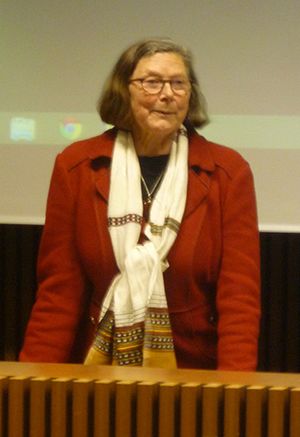Christiane Floyd facts for kids
Quick facts for kids
Christiane Floyd
|
|
|---|---|

Floyd speaking at a conference at the HTW Berlin on 31 March 2015
|
|
| Born |
Christiane Riedl
26 April 1943 Vienna, Austria
|
| Nationality | Austrian |
| Alma mater | University of Vienna |
| Spouse(s) | Robert W. Floyd Peter Naur |
| Scientific career | |
| Fields | Computer science |
| Institutions | University of Hamburg Technische Universität Berlin Softlab Stanford University Siemens |
| Thesis | Radikale für Fastmoduln, Fastringe und Kompositionsringe (1966) |
| Doctoral advisor | Wilfried Nöbauer |
Christiane Floyd (born 26 April 1943) is an amazing Austrian computer scientist. She made history in 1978 by becoming the very first female professor of computer science in Germany. She was also a pioneer in a new way of designing software. This method, called evolutionary participatory software design, was an early idea that led to today's open-source software development.
Contents
Christiane Floyd's Early Life and Education
Christiane Riedl, as she was known then, started her journey by studying mathematics. She attended the University of Vienna in Austria. In 1966, she earned her PhD from the university.
Early Career in Computer Science
After finishing her studies, Christiane Floyd began her career in the growing field of computer science.
Working at Siemens
From 1966 to 1968, she worked at a company called Siemens in Munich, Germany. There, she was a systems programmer. This meant she helped create and manage the basic programs that make computers work. She specifically worked with an ALGOL 60 compiler, which translates computer code into instructions a computer can understand.
Research at Stanford University
From 1968 to 1973, Christiane Floyd moved to the United States. She worked at Stanford University in California. At Stanford, she was a research associate. This role involved doing important research in computer science. She also taught classes part-time.
Developing Software at Softlab
In 1973, she joined Softlab, a software development company in Munich. As a senior consultant, she played a key role in creating and showing off Maestro I. This was a very important invention. Maestro I was the first integrated development environment for software. Think of it as a special workshop where programmers could do all their coding tasks in one place.
Becoming a Professor and Innovator
Christiane Floyd's career continued to break new ground, especially in teaching and developing new ideas.
First Female Computer Science Professor
In 1978, Christiane Floyd became a full professor of software engineering. This happened at Technische Universität Berlin in Germany. This was a huge achievement! She was the first woman ever to become a professor in computer science in Germany.
Leading Software Engineering at Hamburg
From 1991, she led the software engineering group at the University of Hamburg. Here, Professor Floyd and her team made a big contribution. They created one of the first ideas for participatory design methods. This was called the STEPS process model. STEPS stands for Software Technology for Evolutionary Participatory Systems development. It meant involving the people who would use the software in its design. This helped make software that truly met their needs.
Retirement and Continued Work
Christiane Floyd officially retired in 2008. She became a professor emerita at the University of Hamburg. Even after retiring, she stayed active in computer science. She got involved with the WIT project at the Vienna University of Technology. WIT stands for Wissenschaftlerinnenkolleg Internettechnologien, which means Women's Postgraduate College for Internet Technologies. This project offers a special PhD program just for women in computer science. On 26 January 2012, she was given an honorary professorship at TU Wien.
Personal Life
Christiane Floyd was married to two other famous computer scientists. Her husbands were Robert W. Floyd and Peter Naur.
 | Percy Lavon Julian |
 | Katherine Johnson |
 | George Washington Carver |
 | Annie Easley |

